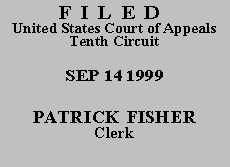

| UNITED STATES OF AMERICA,
Plaintiff-Appellee, |
|
| v. | |
| HAROLD EUGENE BELL,
Defendant-Appellant. |
|
Harold Eugene Bell seeks a certificate of appealability to appeal the district court's denial of his motion for judgment of acquittal and/or new trial, which the court treated as a 28 U.S.C. § 2255 motion. Bell also seeks permission to proceed on appeal in forma pauperis. We deny a certificate of appealability and dismiss the appeal.
Bell was convicted in 1997 of conspiracy to distribute cocaine powder and cocaine base. This court affirmed his conviction in United States v. Bell, 154 F.3d 1205 (10th Cir. 1998). In his motion for judgment of acquittal and/or new trial filed February 22, 1999, Bell alleged the trial court erred in (1) enhancing his sentence for possession of a firearm; (2) allowing testimony from co-conspirators who entered into plea bargains with the government; (3) sentencing him to a 100/1 powder cocaine/crack cocaine quantity ratio; and (4) sentencing him under a racially biased statute. The district court found Bell's motion was untimely under both Fed. R. Crim. P. 29(c) and Fed. R. Crim. P. 33, construed the motion as a request for relief under 28 U.S.C. § 2255, and directed the government to respond. After receiving the government's response, the court agreed that Bell's claims were procedurally barred but addressed each claim on its merits and denied the motion. Bell filed a motion for clarification, asserting his motion was not time-barred because it was based on newly discovered evidence. The district court denied the motion for clarification, finding the testimony cited by Bell did not constitute newly discovered evidence.
On appeal, Bell contends the district court erred in construing his motion for judgment of acquittal and/or new trial as a 28 U.S.C. § 2255 motion because the motion was based on newly discovered evidence. See Anderson v. United States, 443 F.2d 1226, 1227 (10th Cir. 1971) (claims of newly discovered evidence under Fed. R. Crim. P. 33 are timely if filed within two years after the mandate of affirmance from the appellate court). However, Bell has never alleged any newly discovered evidence. The court did not err in treating the motion as requesting relief under 28 U.S.C. § 2255. The court addressed the merits of Bell's claims and found he was not entitled to relief. Bell does not address those claims in his appeal.
We DENY Bell's request for a certificate of appealability because he has failed to make a substantial showing of a denial of a constitutional right. See 28 U.S.C. § 2253(c)(2). Bell's motion for leave to proceed on appeal in forma pauperis is DENIED. The appeal is DISMISSED. The mandate shall issue forthwith.
Entered for the Court
Mary Beck Briscoe
Circuit Judge
*.This order and judgment is not binding precedent, except under the doctrines of law of the case, res judicata, and collateral estoppel. The court generally disfavors the citation of orders and judgments; nevertheless, an order and judgment may be cited under the terms and conditions of 10th Cir. R. 36.3.